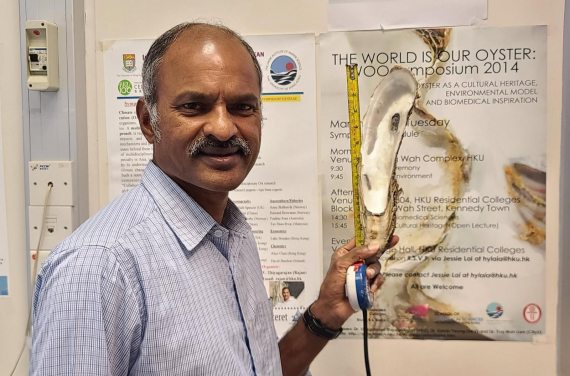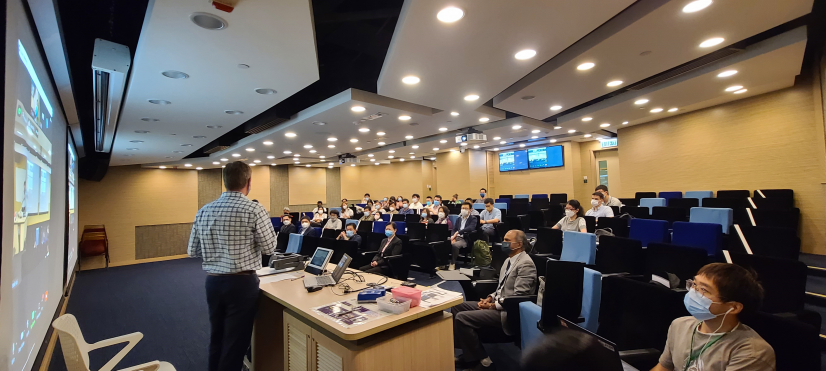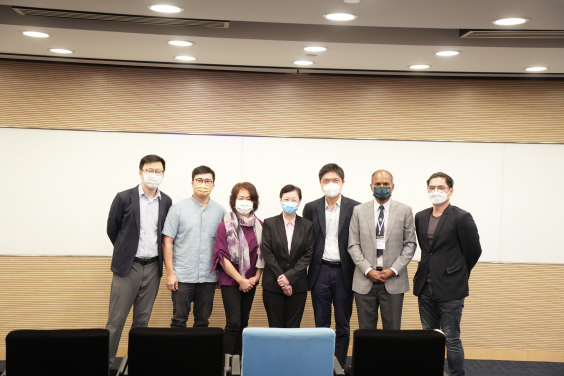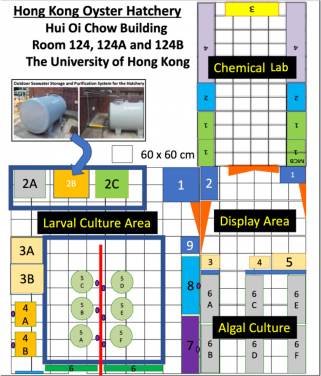Media
HKU marine scientists join hands with local oyster industry
to set up the first oyster hatchery in Hong Kong,
cultivating native seeds to sustain oyster aquaculture
09 Jun 2022

The hatchery is not only for oyster seed production, but also a platform for research, education, and knowledge exchange, says Dr Thiyagarajan VENGATESEN of HKU School of Biological Sciences and The Swire Institute of Marine Science.

At the kick-off meeting of The Hong Kong Oyster Hatchery and Innovation Research Unit, hatchery and aquaculture experts, and representatives from local oyster industry, government agency and other stakeholders gathered to discuss the sustainability of oyster aquaculture in Hong Kong.

From left to right: Mr CHUNG Shiu Cheong, General Manager of Oyster Hatchery (China), Mr Brian LEE (Director of Manufacturing) and Mrs Elizabeth MOK (Technical Service Director) of Lee Kum Kee Company Limited; Professor Vivian Wing-Wah YAM, HKU Dean of Science (Interim) and Philip Wong Wilson Wong Professor in Chemistry and Energy; Mr CHOW Wing-Kuen, Senior Fisheries Officer (Aquaculture Fisheries) of Agriculture, Fisheries and Conservation Department; Dr Thiyagarajan VENGATESEN of HKU School of Biological Sciences and The Swire Institute of Marine Science; Mr Fung CHAN of Hong Kong Oyster Company Limited.
Oysters have been an important commodity in Hong Kong for more than 700 years. While serving as a tasty and highly nutritious food source, oysters also clean and enrich our seawater, and their reefs provide habitat and nursery grounds for many native species that are otherwise lost from our shores.
However, the local oyster agriculture in Lau Fau Shan and the surrounding waters of Deep Bay has been severely hindered by coastal modification, the seasonal shift in temperature and salinity due to climate change, pollution and emerging pathogens in the recent years, which not only leads to huge summer and winter mortality of oysters (as high as 80%), but has also affected the livelihood of thousands of growers around the area. As demand for sustainable supply of this precious seafood is rapidly growing, there is an urgency to identify an oyster strain with relatively high-stress tolerance and immune resistance power to overcome at least some of these novel human-induced environmental constraints.
In view of this, Marine Scientists at the School of Biological Sciences and The Swire Institute of Marine Science (SWIMS) of The University of Hong Kong (HKU), joined hands with the local oyster industry to set up the Hong Kong Oyster Hatchery & Innovation Research Unit, which aims to develop innovative hatchery technology in partnership with growers and industry that re-establishes high-quality natural resources and delivers superior oyster seeds for sustainable coastal aquaculture particularly in South China and Hong Kong. The facility will commence operation in July 2022.
On 27 May, 2022, the hatchery and aquaculture experts from the northern, middle and southern part of mainland China gathered at HKU to discuss the oyster hatchery and its relevance for sustainable aquaculture with Hong Kong’s oyster growers, government agency, industry, NGOs researchers, and other stakeholders, in order to identify ways through which the proposed oyster hatchery could be integrated with national efforts to develop sustainable oyster aquaculture with a global perspective.
The project received 5.28 million funding from the Sustainable Fisheries Development Fund (SFDF) of the Agriculture, Fisheries and Conservation Department (AFCD), and a generous donation of 3 million from Lee Kum Kee Company Limited. Under their support, an oyster hatchery at a research scale will be set up at HKU campus, using novel hatchery technologies to enhance oyster seed production. After the settlement of the oyster spat, the final stage of seed production will take place at the laboratory of SWIMS, which is located in the Cape D’Aguilar marine reserve, where the seeds will be maintained and monitored for a few weeks before being supplied to local growers.
The laboratory set up at The Hong Kong Oyster Hatchery
- The hatchery at HKU Campus contains an Algal Culture area to supply adequate food for the nursery culture of both oyster larvae and spats in the hatchery room.
- A Larval Culture area made the major part of the hatchery, which has its own re-circulation facility for over 2000L of seawater and supports larval settlement and spat culture facility.
- A significantly large Chemical Lab area for studying oyster meat quality and food safety parameters.
The project aims to produce oyster seeds of three local oyster species: Crassostrea hongkongensis (Hong Kong oysters), Crassostrea ariakensis (Suminoe oysters) and Crassostrea angulata (Portuguese oysters), and estimates to produce 10,000 strings of oyster seeds, with each string holding 200 good quality oysters approximately per year. The trial seed production will start in summer 2022, and full-scale seed production is expected to be done by summer 2023. Local stakeholders, including oyster growers, will adopt the technology for their oyster production by the year 2024.
Building these innovative tools would help local growers and government authorities to modernise the oyster aquaculture industry in the region, particularly in South China and Hong Kong.
Mr CHOW Wing Kuen, Senior Fisheries Officer (Aquaculture Fisheries) of the AFCD noted, “Oyster hatchery will demonstrate the feasibility and economic viability of local oyster seeds production, which ensures faster growth of disease-resistant local strains, and improve the livelihood of local oyster farmers.”
Mr CHUNG Shiu Cheong, General Manager of Oyster Hatchery (China) said on behalf of Lee Kum Kee Company Limited, that the company would continue to seize every opportunity to contribute to the society, “We are honoured to have this opportunity to collaborate with the research team at HKU which specialises in oceanology and marine science. We truly believe it will lead the local oyster industry to a bright and successful future.”
Professor Vivian Wing-Wah YAM, HKU Dean of Science (Interim) and Philip Wong Wilson Wong Professor in Chemistry and Energy appreciated the collaboration between HKU Marine Scientists and the industry, “I am delighted to have representatives from local oyster growers, the government, industry, NGOs and student entrepreneurs gathering to develop a strong interlined network of collaborations and knowledge exchange involving all stakeholders and importantly, local industry and to discuss and identify ways to tackle and overcome the challenges.”
Dr Thiyagarajan VENGATESEN of HKU School of Biological Sciences and The Swire Institute of Marine Science, who took the lead in setting up the Hong Kong Oyster Hatchery & Innovation Research Unit said, the hatchery was designed not only for oyster seed production but also as a platform for research, education, and knowledge exchange, “We hope that this oyster hatchery will foster interdisciplinary research to modernise the green carbon neutral oyster aquaculture industry, as well as networking with global leaders to identify quality breed that contains trait of interest using big data and machine learning tools.”
Images download and captions: https://www.scifac.hku.hk/press
For media enquiries, please contact Ms Casey To, External Relations Officer (tel: 3917 4948; email: caseyto@hku.hk / Ms Cindy Chan, Assistant Director of Communications of HKU, Faculty of Science (tel: 3917 5286; email: cindycst@hku.hk).

